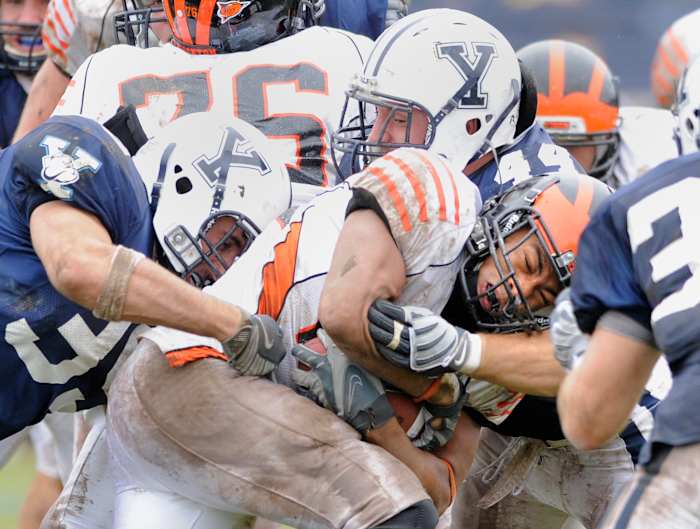The Ivy League’s decision to participate in the FCS playoffs marks a significant shift in its football tradition, as the conference ends a long-standing postseason prohibition.
The Ivy League, known for its dedication to academic excellence, has announced its football teams will compete in the FCS playoffs beginning next season. This decision ends a century-long ban on postseason play, a policy originally intended to allow athletes to concentrate on their studies, according to the conference’s recent statement.
Mason Shipp, a Yale receiver and chair of the conference’s Student-Athlete Advisory Committee, expressed excitement over this historic change. He called it a ‘monumental day’ for the league and encouraged future athletes to ‘go win us some hardware!’ The call for this change arose after a year-long study conducted by the committee.
The recent conclusion of the 2024 Ivy League season saw Columbia, Dartmouth, and Harvard sharing the championship title—a notable achievement for Columbia, which clinched its first conference title since 1961. The league will use the upcoming offseason to establish a tiebreaker system to determine its automatic qualifier for the FCS playoffs.
Harvard coach Andrew Aurich expressed gratitude towards the Ivy League Presidents for enabling student-athletes to compete for a national championship. He highlighted the current competitiveness of Ivy League football and voiced optimism for its performance in the playoffs. The excitement is shared as Ivy League football, which once dominated the sport in its early days, re-enters the national stage.
In the earlier years of college football, schools that would later form the Ivy League were powerhouses, with Yale and Princeton claiming 23 of the first 25 unofficial national titles in the late 1800s. Harvard secured the remaining two and went on to add more championships, including a 1919 Rose Bowl victory. However, these schools opted out of postseason competitions in the following decades to maintain focus on academics.
Over time, college football evolved, with the southern and western regions gaining dominance. Large stadiums and lucrative TV contracts transformed the sport into a major enterprise, while athletic scholarships and the NFL increased its allure for student-athletes. Despite these changes, the Ivy League abstained from postseason play to prioritize academic commitments, a stance that rendered its football policy unique among its extensive athletics programs.
Nevertheless, starting in 2025, the Mid-Eastern Athletic Conference and the Southwestern Athletic Conference will remain the only conferences not participating in the FCS playoffs, as major football conferences like those in the Southeastern Conference and Big Ten engage in the Football Bowl Subdivision and the separate College Football Playoff for national titles.
The Ivy League’s contribution to the NFL remains significant, with players from the conference having participated in 10 of the last 12 Super Bowls, and numerous alumni occupying positions within NFL front offices and coaching staffs. Robin Harris, the Ivy League’s Executive Director, emphasized the league’s proud tradition of impactful and influential participation in college football. She expressed anticipation for this new era of competitive success.
The Ivy League’s entry into the FCS playoffs represents a momentous change, bridging its storied past with a promising future in college football.
Source: Local10














